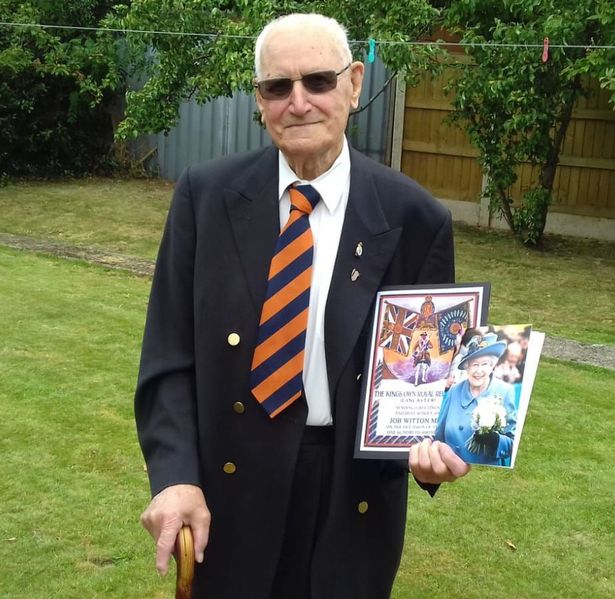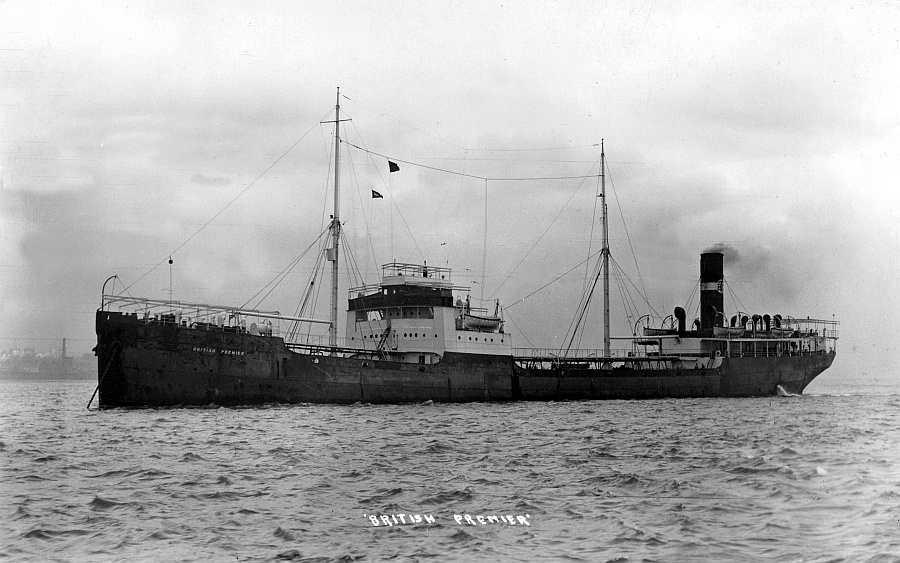1 December 1940
Greek troops capture
Pogradec in Albania from the Italians
In Italy pasta was now
rationed.
It was the last of the three worst nights of the
German bombing on Southampton.
 |
2 December 1940
The armed merchant
cruiser, HMS Forfar, was sunk south west of Scotland, by German
submarine, U99, with the loss of 173 lives of the 194 crew.
 |
3 December 1940
Greek troops capture
Sarande, a coastal town in Albania.
 |
4 December 1940
Private Job Witton of the 5th King’s Own, who had been captured
in Northern France on 29th May 1940, arrived in Liverpool, from
Gibraltar, His escape from the Germans had seen him travel
through occupied France, Vichy France and neutral Spain. Job's
successful escape saw him awarded the Military Medal.
(Pictured below on his 100th Birthday in 2018.)
Greek troops capture
Permet and take more than 500 Italians as prisoner in Southern
Albania.
 |
5 December 1940
The Greek II Army Corps
now broke into Albania.
In Lancaster the former Kingsway
Cinema on Parliament Street was requisitioned in order to store
property salvaged from bombed areas of the city.
 |
6 December 1940
The Chief of the Italian
Army was replaced due to the military reverses in Greece.
Mussolini made an approach to German for assistance in the war.
 |
7 December 1940
Adolf Hitler said that
Mussolini should resort to mobile courts martial execution if he
wanted to turn the situation around in Greece. Hitler did
authorise 50 heavy troop transport planes to move fresh units
from Italy to Albania.
The British Fairey Barracuda dive
bomber had its first test flight.
 |
8 December 1940
Greek troops occupied
Gjirokaster and Delvine in Albania.
The British cargo liner
SS Calabria was torpedoed and sunk by the German submarine U103
off Ireland. All 360 passengers and crew were lost.
The Chief Cook was Santan Martins, who at the age of 79 years of
age, may have been the oldest merchant seaman to be killed at
sea in the Second World War.
 |
9 December 1940
In the Western Desert,
Egypt, Operation Compass was launched by the Allies. The
Western Desert Force advanced from Mersa Matruh in Egypt,
launching a five day raid against the Italians. The
British were to take over 38 000 Italian and Libyan prisoners of
war, plus hundreds of tanks, guns and many aircraft.
2nd
Battalion, King's Own, take part in the defence of Mersa Matruh.
 |
10 December 1940
In the Western Desert the
Battle of Sidi Barrani begins.
Two Nazi spies, Jose Waldberg
(left)
and Carl Meier (right), found guilty under the Treachery Act of 1940,
were the first to be hung at Pentonville Prison in London.
Both men had crossed the channel on 3rd September and planned to
spy and report back to Germany to assist the planned German
invasion. Both were arrested on the morning they arrived
having raised suspicions of a pub land lady when ordering a
bottle of cider in the morning, the sale of which was prohibited
by licensing laws.

 |
11 December 1940
In the Western Desert the
British achieved victory over the Italians at Sidi Barrani.
 |
12 December 1940
It was the first of four
nights of bombing of the City of Sheffield, in South Yorkshire.
A total of 660 people were killed, 40 000 made homeless, with 3
000 homes demolished and more than 3 000 seriously damaged.
Six George Medals were awarded to the citizens of Sheffield for
their bravery in the raids.
 |
13 December 1940
Hitler issued Directive
Number 20, on the German invasion of Greece.
 |
14 December 1940
The Italian submarine, 'Naiade'
was shelled and sunk off Bardia, Libya, by HMS Hereward and HMS
Hyperion.
 |
15 December 1940
In a gesture of
reconciliation by Adolf Hitler the ashes of Napoleon II were
brought from Vienna to Paris.
With the recapture of Sidi
Barrani, the 2nd Battalion, King's Own, are ordered back to
Cairo.
 |
16 December 1940
The Royal Air Force under
took the first area bombardment of a German city, Mannheim, when
134 bombers attacked the city and started large fires on both
sides of the Rhine.
 |
17 December 1940
The British captured Fort
Capuzzo and Sollum near the Egyptian and Libyan border.
Dorothy O'Grady of the Isle of Wight, was found guilty of making
a plan likely to assist the enemy and with the intent to help
the enemy she had cut a telephone wire. Found guilty she
was sentenced to death, which was commuted to 14 years in prison
of which she served 9 years.
 |
18 December 1940
Adolf Hitler issued
Directive Number 21 on the German invasion of the Soviet Union.
 |
19 December 1940
German submarine U37
mistakenly torpedoed and sunk the Vichy French submarine 'Sfax'
and support ship 'Rhone' off the coast of Morocco. The
U-Boat campaign did not recorded either in the ships log.
 |
20 December 1940
Three consecutive nights
of bombing of Liverpool began, known as 'The Christmas Blitz'.
Two Royal Air Force Spitfires attached Le Touquet in France,
attacking targets of opportunity such as power transformers.
RAF tactics moved to a more offensive role from this time.
The small Dutch Navy managed to escape across the Channel to
Britain.
 |
21 December 1940
The Royal Air Force
bombed docks and oil tanks at Porto Marghera, near Venice,
Italy.
The Irish ferry 'Innisfallen' struck a mine off
the Wirral Peninsula and sank with the loss of 4 of the 220
people on board, on the Dublin to Liverpool route.
 |
22 December 1940
In the Greek-Italian War
the Battle of Himara ended in Greek Victory.
Heavy raids over
Manchester began and over the next two days a total of 654
people were killed and over 2000 injured.
 |
23 December 1940
Prime Minister Winston
Churchill broadcast an appeal to the people of Italy, telling
them to overthrow Mussolini for bringing them into the war.
Although, as in Germany, it was forbidden in Italy to listen to
foreign broadcasts.
In Lancaster, Mr George Harrison, Garage
Night Foreman, Lancaster Corporation Transport Department,
volunteered to drive a vehicle containing equipment and
personnel to an area which had been set on fire during a heavy
air raid. Although he was in no way a part of the fire
fighting service, Harrison helped the firemen in hose laying and
branch holding. When a pump was sandwiched between two
intense fires and in danger of being destroyed, he volunteered
to help to remove it. Harrison's courage in the face of
danger and his will co-operation were outstanding. He was
later awarded the British Empire Medal.
 |
24 December 1940
The tanker 'British
Premier' was torpedoed and sunk in the Atlantic Ocean, 200
nautical miles south west of Freetown, Sierra Leone. 32 of
her 45 crew were lost, 9 survivors were rescued by HMS Hawkins
on 3rd January 1941 and 4 more by HMS Faulknor on 3rd February.
 |
25 December 1940
In Palestine, Bethlehem
is blacked out owing to the threat of Italian bombing.
BBC
Radio broadcasts included 'From the Children' a radio card of
Christmas greetings from evacuated children in Great Britain,
Canada and the US, to their parents and others. 'Christmas
under fire' described Christmas Day on the front line from a
whole range of military and civilian people.
 |
26 December 1940
The German cargo ship
'Baden' was scuttled 500 miles off Spain, when it was
intercepted by the British Light Cruiser, HMS Bonaventure.
Adolf Hitler spoke to troops at a Christmas Dinner at a Hotel in
Metz.
 |
27 December 1940
The German fire bombing
of London began. Over the next few days 20 000 British
firemen struggle to extinguish the flames.
 |
28 December 1940
Italy asked for
assistance in the Greco-Italian War.
 |
29 December 1940
United States of America
President Roosevelt made a radio broadcast promising to help the
United Kingdom fight Nazi Germany with the provision of war
supplies.
The fire bombing of London continued.
 |
30 December 1940
The famous photograph of
St. Paul's Cathedral, in the middle of a London in flames, was
taken on this day.
 |
31 December 1940
Royal Air Force bombers
attacked Italian held Vlore in Albania, as well as targets in
the Netherlands and Germany, including Rotterdam and Cologne.
In the Western Desert, 2nd Battalion, King's Own, now in Cairo,
Egypt, belatedly celebrated Christmas Day. Their main duty
now was to guard the many Italian and Libyan prisoners of war
captured in the recent fighting.
 |


































